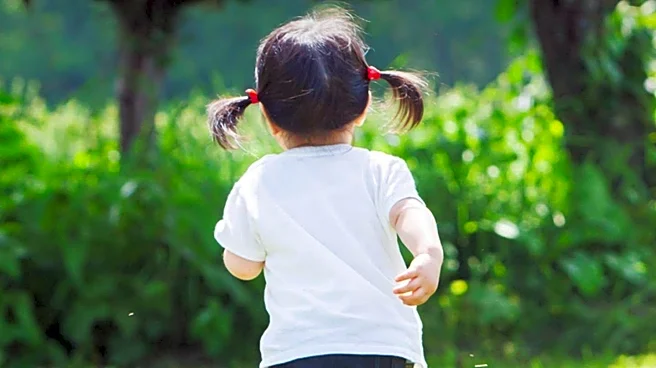What's Happening?
A Kansas mother, Bella Thieme, shared a touching moment on social media, capturing her toddler's reaction to the accidental home birth of her baby sister. The video, posted on TikTok under the handle @bella.thieme, has garnered over 1.2 million views
and 257,000 likes. It features a series of images showing Thieme holding her newborn, with her husband and toddler looking on. The toddler's expression of joy and curiosity during the unplanned home birth has resonated with viewers. Thieme, 23, explained that the birth occurred without medical assistance, and her toddler was unexpectedly present. Despite the lack of planning, Thieme expressed gratitude for the experience, noting the positive impact it had on her family.
Why It's Important?
The viral video highlights a shift in societal perceptions of childbirth, often viewed as a clinical or traumatic event. Thieme's experience and the public's positive response underscore the potential for childbirth to be seen as an empowering and beautiful process. The widespread attention the video received suggests a growing interest in authentic family moments and the normalization of diverse birth experiences. This could influence public discourse on childbirth, encouraging more open conversations about the realities and possibilities of home births and family involvement.
What's Next?
The viral nature of the video may inspire other parents to share their own birth stories, potentially leading to a broader acceptance of home births and family participation in such events. As more families consider alternative birthing options, there may be increased demand for resources and support for home births. Additionally, the positive reception of the video could encourage social media platforms to feature more content that challenges traditional narratives around childbirth.
Beyond the Headlines
The story also touches on the cultural dimensions of childbirth, challenging the often medicalized view of the process. By sharing her experience, Thieme contributes to a broader cultural shift that embraces the natural and familial aspects of birth. This could lead to a reevaluation of how society supports and educates families about childbirth, potentially influencing healthcare policies and practices to accommodate a wider range of birthing experiences.

















